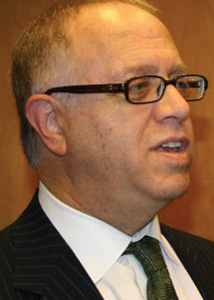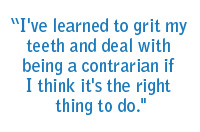City Council candidate wants NYPD Commish Shea ‘hung by his cajones’

A prominent labor lawyer running to replace Corey Johnson on the City Council says NYPD Commissioner Dermot Shea should be “hung by his cahones (sic).”
Arthur Z. Schwartz, one of six candidates in the West Side’s District 3, which includes Greenwich Village, Chelsea, and Hell’s Kitchen, made the vulgar remark in a candidate questionnaire by the Jim Owles Liberal Democratic Club, a citywide advocate for the LGBTQ community.
“Should the NYPD Vice Squad be eliminated?” the survey asked, one of several questions on police and jail issues.
“Yes,” Schwartz replied.
“Should Dermot Shea be fired immediately?”
“Hung by his cahones,” Schwartz wrote, misspelling cajones, the Spanish word for testicles.
Schwartz, 68, a longtime progressive activist, has been endorsed by Black Lives Matter of Greater New York and the Transportation Workers Union, among others.
His son, Jacob Schwartz, a former de Blasio administration employee, was sentenced in 2019 to three years in prison after pleading guilty to possessing child pornography.
Schwartz made no apologies for his comment. “Shea is never, ever critical of anything his officers do,” he told The Post. “I think he has only exacerbated tensions between the police and both the minority community and white activists… and I think that’s disgraceful.”
From his website:
Arthur offered himself as counsel to social movements, having counseled anti-nuclear groups, anti-Central America intervention groups, ACORN, NY Communities for Change, Make the Road NY, Occupy Wall Street, anti-gas pipeline activists, and Black Lives Matter. He founded Advocates for Justice, a non-profit legal foundation whose work includes working with parents who have sued Success Academy a dozen times for mistreating students, and encroaching on space needed for special education students. He has won election and polling place reform, (he was on a team which got the 2020 Democratic Presidential Primary restored), representing elderly tenants in eviction and landlord disputes. Currently, Arthur also hosts a weekly radio show on Mondays at 5 PM on WBAI, whose guests have included Alexandria Ocasio-Cortez, Samelys Lopez, Jamaal Bowman, Mondaire Jones, and Jumaane Williams and leaders of environmental, tenants rights, criminal justice reform groups and groups fighting systemic racism, like Black Lives Matter. And, when WBAI was faced with closure in 2019, Arthur successfully litigated in court to keep the nonprofit, listener-supported station on the air, and then became General Counsel to the entire nationwide network it was part of.
Arthur Z. Schwartz
 This month’s “West Village Original” is Arthur Z. Schwartz, who settled in the West Village in 1981. Currently a lawyer and partner in a Union-side labor and employment firm, he was also just hired as general counsel for ACORN. Beginning in 1995, Schwartz was elected to five consecutive terms as the Democratic Party District Leader for Greenwich Village and South Chelsea. In 2006 he was elected New York State Democratic Committee Member for the 66th Assembly District, a position he still holds.
This month’s “West Village Original” is Arthur Z. Schwartz, who settled in the West Village in 1981. Currently a lawyer and partner in a Union-side labor and employment firm, he was also just hired as general counsel for ACORN. Beginning in 1995, Schwartz was elected to five consecutive terms as the Democratic Party District Leader for Greenwich Village and South Chelsea. In 2006 he was elected New York State Democratic Committee Member for the 66th Assembly District, a position he still holds.
“I love the West Village, but I think I picked it by accident,” confesses Arthur Z. Schwartz. For the Bronx-born attorney and current New York State Democratic Committee Member for the 66th Assembly District, it wasn’t the first neighborhood he had in mind. “In 1981, I actually bought a little building on 6th Street in the East Village,” he recalls. “My mother was giving me the money for it so I asked her to come to the signing. She looked at the building and afterward, at dinner, started to cry, saying, ‘I don’t want you to live on a block like this!’ So I canceled the contract and decided I wanted to live in the West Village instead. I walked around the entire neighborhood until one day I noticed an apartment for rent at 99 Bank Street. Here I still am 28 years later.”
It was also Schwartz’s mother from whom he got his sense of community service. “My mother had a penchant for volunteering for many different causes,” he remembers. “She wasn’t political, though. She was more interested in community service and activism on the local level.” Taking it one step further, Schwartz parlayed his community service into political office. Beginning in 1990, when he founded Friends of Bleecker Playground, Schwartz went on to hold such various positions as member of the Executive Committee of Village Independent Democrats; member of Community Board 2 in Manhattan (since 1991); park activist for the West Village; and Board member, Hudson River Park Alliance and Friends of Hudson River Park. It was this last position that got him elected to his first term as Democratic District Leader.
 For Schwartz, this maiden voyage into elected office came at a price because it cost him a lot of support. “Most West Villagers were against the Hudson River Park. They thought it was about luxury housing and massive development,” he explains. “I first bought into that as well. Then when I got elected in 1995 I actually broke with the prevailing sentiment and supported building the park. I saw it as a potential recreational place. At that point, my wife Kelly and I had two young children and I could see they needed some place to do their thing. So I became a leader in the effort to build it. Consequently, I lost a lot of friends in the West Village who accused me of selling out. I think most of those people got over it, but it took a long time. I proved that my perspective was right, however. The park never did become a center of commercial development.” For Schwartz, this support for unpopular issues is par for the course. “I’m not someone who worries about going against the tide,” he admits. “I’ve learned to grit my teeth and deal with being a contrarian if I think it’s the right thing to do.”
For Schwartz, this maiden voyage into elected office came at a price because it cost him a lot of support. “Most West Villagers were against the Hudson River Park. They thought it was about luxury housing and massive development,” he explains. “I first bought into that as well. Then when I got elected in 1995 I actually broke with the prevailing sentiment and supported building the park. I saw it as a potential recreational place. At that point, my wife Kelly and I had two young children and I could see they needed some place to do their thing. So I became a leader in the effort to build it. Consequently, I lost a lot of friends in the West Village who accused me of selling out. I think most of those people got over it, but it took a long time. I proved that my perspective was right, however. The park never did become a center of commercial development.” For Schwartz, this support for unpopular issues is par for the course. “I’m not someone who worries about going against the tide,” he admits. “I’ve learned to grit my teeth and deal with being a contrarian if I think it’s the right thing to do.”
When asked how the West Village has changed since he first moved here, Schwartz mentions three things. “First, I would say that the Village was much more economically diverse,” he says. “There were a few co-ops but most people who lived here were tenants in rent-stabilized or rent-controlled apartments. They were mostly struggling artists of some sort, an amazing array of them. Nowadays, except for older people and some of my neighbors, West Village artists are on a completely different level. They’re extremely successful, so economically it’s become much more high end.
“Secondly, it’s become much more family-friendly here,” he continues. “That’s a big change. It was my political base when I ran for office: working with local parents to clean up parks and playgrounds and make life better for our kids.
“And the third is that the West Village was much more gay. Today it hardly is. A lot of my gay neighbors died in the 80s or moved on to other areas, like Chelsea. However, I built pretty close ties with gay and lesbian activists around here and maintained those ties over the years. That was a part of my political identity that I learned from living here, but that aspect has definitely changed.”
As a long-time West Village resident and politician, Schwartz also has a few ideas about how he’d like to see this neighborhood in the future. “For one, I’d like to preserve the last vestiges we have of local businesses,” he ventures. “Every time one of them closes I feel like a piece of us is taken away. Also, I think we’ve got enough high-end wealthy people. We need to maintain some economic diversity in the West Village. And I say that as a building owner who’s paying $65,000 a year in property taxes! I have to get the most out of the apartments in my townhouse so I understand the pressures on landlords. Most of my fellow non-billionaire neighbors pay huge real estate tax bills and they’re struggling to stay in their houses.”
Despite the challenges, living here never grows old for Schwartz. “There’s a special quality to the West Village,” he declares. “It’s amazing how many people you know when you walk down the street. It’s like a small town. I find it incredible to live in New York in a low-rise neighborhood that’s close knit and friendly and yet be fifteen minutes from Times Square. I can’t imagine ever leaving.”

No comments:
Post a Comment